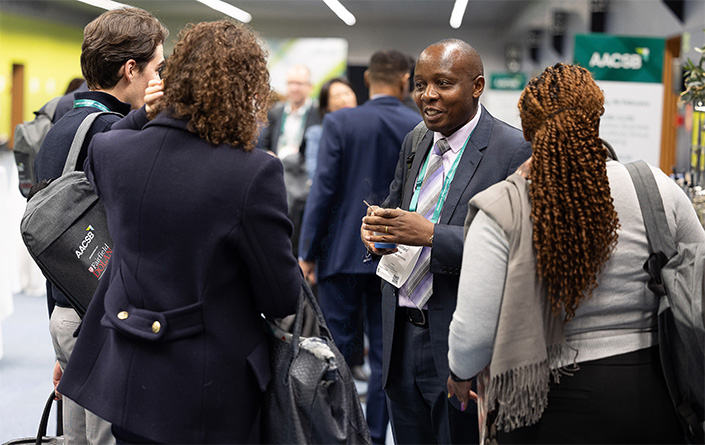The ‘Continuous Work’ of Teaching Business Ethics
The results of Transparency International’s 2020 Corruption Perceptions Index are sobering—the most recent CPI shows that the world is making little progress in decreasing corruption and increasing ethical practices in businesses and governments.
Each year since 1995, the Berlin-based nonprofit has scored 180 countries according to their perceived level of government corruption—from zero (highly corrupt) to 100 (very clean)—based on surveys of experts and businesspeople. “While most countries have made little to no progress in tackling corruption in nearly a decade, more than two-thirds of countries score below 50,” write the report’s authors. “Our analysis shows corruption not only undermines the global health response to COVID-19, but contributes to a continuing crisis of democracy.”
Many of the countries where scores have stalled—and, in some cases, declined—are in the Middle East and North Africa (MENA). While the United Arab Emirates and Qatar had comparatively high scores (71 and 63, respectively), countries such as Syria, Yemen, Sudan, Libya, and Iraq came in near the bottom. “With an average score of 39 for the third consecutive year,” the report notes, the MENA region “is still perceived as highly corrupt, with little progress made towards controlling corruption.”
How can business schools inspire greater progress? AACSB Insights invited two educators to weigh in on the state of business ethics in the MENA region. Carole Doueiry Verne is a professor with the Faculty of Management at Saint Joseph University of Beirut; and Ülkü Gürler is dean of the Faculty of Business Administration at Bilkent University in Ankara, Turkey. Both are members of AACSB International’s MENA Advisory Council.
‘Fighting for Ethics’
Verne, who has taught ethics since 1999, says that she likens her work to “a grain of sand in the desert, because around us the corruption is only increasing.” For instance, in 2020 the CPI score of her native Lebanon was only 25—five points lower than it was in 2012. Such a downward trend “can make consumers, students, and citizens feel jaded,” she says. “People who wish to fight for ethics, or against corruption, give up because they feel their efforts are in vain.”
Both Verne and Gürler believe business educators can change the ethical trajectory of the region for the better by training ethical leaders, making a powerful business case for ethical practices, and inspiring governments to effect substantial change. But, first, schools will need to overcome four significant obstacles:
Cultural norms. Verne and Gürler emphasize that educators in MENA countries must take a different approach to teaching ethics than their colleagues in other parts of the world. Professors elsewhere might tackle the topic by discussing high-profile scandals such as Wells Fargo’s fake customer accounts or Elizabeth Holmes’ promotion of a fraudulent blood-testing technology. But professors in MENA countries must spend more time discussing the negative implications of smaller, more personal instances of unethical behavior.
Take the issue of cheating. In Turkish culture, “cheating is considered to be ‘helping a friend,’ and someone who refuses might be isolated from certain groups,” Gürler explains. “This cultural norm is very important to break.”
Turkish citizens also tend to be intolerant of those with contrasting opinions and backgrounds. “The impact of feudal cultures has not totally disappeared in these countries,” says Gürler.
A view of ethics as a “means to an end.” In some cases, businesses adopt ethical practices only to improve their reputations or attract new customers, says Verne. Students who see such examples might deduce that managers should adopt ethical practices only when doing so improves an organization’s bottom line.
The sociopolitical and business climate. On a broader scale, political and financial instabilities occur frequently in MENA countries, and many governments pay insufficient attention to regulation and human rights protections, says Gürler. Such lack of oversight means that local companies that do business with the state often must play “political games that may hinder factors such as fair competition and the merit-based selection of projects.”
In Turkey, specifically, a significant percentage of citizens also lack college education and, as a result, earn low average incomes. In fact, half of all young people do not earn college degrees, and those who do can face high unemployment. Together, says Gürler, these factors create a “suitable climate for arising ethical issues.”
“When managers at many companies and institutions do not follow rules or regulations, and are not held accountable when rules are broken, no one believes in ethics anymore.” —Carole Doueiry Verne, Saint Joseph University
A lack of role models. Professors can infuse discussions of business ethics in every class, says Verne, but those lessons can fall on deaf ears if students see so many examples of institutions acting badly. “I realize how great the gap is between what we advocate and what students see concretely applied,” says Verne. “When managers at many companies or institutions do not follow rules or regulations, and are not held accountable when rules are broken, no one believes in ethics anymore.”
This reality is especially frustrating, she adds, “because ethical practices can have such a positive multiplier effect, at all levels of an organization or a society, when leaders actually apply them.”
But by producing larger numbers of responsible business leaders, says Gürler, business schools will create a virtuous cycle in which “the more businesspeople behave according to a set of shared ethical values, the more they will act as role models for others.” Through their example, such leaders will encourage others to embrace diversity, support sustainability, and promote greater fairness across cultures. Over time, she adds, this cycle will push business and society to change for the better.
Leading Through Examples
Gürler and Verne believe that if MENA business schools are to overcome these obstacles, they must do more than merely promote ethical rhetoric in their classrooms. They also must prominently highlight the benefits of adopting ethical business practices in the real world. “We must show students that, to fight corruption, actions are more important than words,” says Verne.
With this goal in mind, a few years ago, Saint Joseph University introduced a standalone core course in ethics in its bachelor’s, master’s, and MBA programs. International business leaders often come to speak to students about how ethical business practices are applied in their home countries. The course also highlights cases involving ethics-based management from both at home and abroad.
Most important, says Verne, the course combines theory with practical case studies and exercises to make the subject as concrete as possible. For example, students complete projects in which they design reforms that address corruption in a particular industry and region. In their projects, they must provide concrete examples of corruption and demonstrate how their solutions could change outcomes. This work allows students to question and address “corrupt practices that seem so natural, when in reality they plague institutions,” says Verne.
Verne also presents students with examples from a culture known for its ethical integrity: Japan. In a 2018 book, Verne and co-author Olivier Meier of the University of Paris-EST highlight examples of Japanese multinational corporations that apply ethical business practices at all levels—marketing, management, human resources, innovation, and technology.
“Well-educated people who have the will to change and who believe in ethical principles have the power to change the whole society for good.” —Ülkü Gürler, Bilkent University
“We use the findings of our research to show, through practical examples, that ethics can be the key to success for companies,” says Verne. “Our research offers true case studies that we can use in our ethics courses.”
Bilkent University’s Faculty of Business Administration offers elective courses in environmental, financial, and social sustainability, as well as a standalone business ethics course. To address the cultural norm that normalizes cheating, for example, the ethics course incorporates issues such as academic integrity, cheating, and plagiarism. “To change students’ mindsets,” says Gürler, “we emphasize objectivity in grading, fairness, and the importance of receiving a grade that one really deserves.”
The Courage to Change
In addition to examples from business, Verne points to the United Nations’ Sustainable Development Goals as another source of inspiration. Verne is pleased to see a growing number of Lebanese organizations—such as banks and universities—internalize the SDGs as part of their missions. “More companies are installing solar photovoltaics or sorting their waste,” she says, “and we increasingly are seeing universities integrate the SDGs, directly or indirectly, into their courses and conferences.”
Gürler, too, is hopeful for the future in Turkey, which aspires to become a member of the European Union. If EU membership is the goal, then Turkey’s business and political leaders “will need to take business ethics more seriously,” she says. “Well-educated people who have the will to change and who believe in ethical principles have the power to change the whole society for good.”
Both scholars believe that if business schools make ethics an integral part of their cultures and curricula, they can act as “vectors of positive change” throughout the region. And they can do so not only by highlighting how ethical practices help businesses thrive, but also by “shedding light on the dysfunctions that arise when unethical practices are applied,” says Verne.
“We must have the courage to point these dysfunctions out and make the necessary changes,” she stresses. “It is crucial to let the students understand that ethics is not just a theory. We must make them realize that failure to apply ethics pushes organizations toward corruption and inefficiency. This is our continuous work.”





